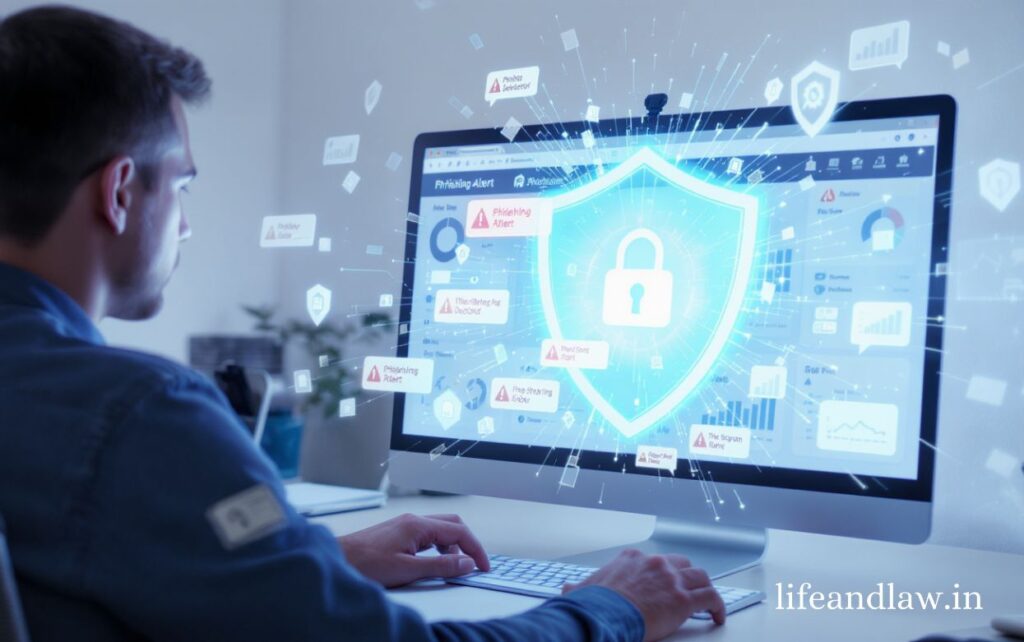Trending

With the tremendous expansion of internet usage in the digital age, cybercrime has grown more widespread. Safer Internet Day strives to promote responsible and safe internet use while raising awareness about online risks and cybersecurity.
Phishing emails, false calls, fraudulent websites, OTP frauds, and misleading social media postings are all becoming more common online. This article attempts to educate readers on various types of online fraud and provide practical safety recommendations to help them stay secure in the digital world.
Phishing – Attempt to gain personal information by sending emails, messaging, or visiting fraudulent websites through phone.
OTP and Banking Fraud – Fraudulent calls or messages requesting OTPs, passwords, or banking information.
Social Media Fraud – Fraud through forged profiles, false lotteries and rewards, or under the guise of friendship.
E-commerce Fraud – Scammers use bogus online shopping websites and social media marketing.
Malware and Hacking – Information might be stolen through malicious apps, email attachments, or websites.
Romance Scam – Creating emotional connections on dating apps or social media in order to extort money.
Investment Fraud – Promises of large profits are used to entice people into investing in bogus schemes.
Deep Fake Scams – Making movies using phones of well-known individuals for nefarious purposes.
Job and Lottery Fraud – Obtaining money by claiming to offer false jobs or lottery winners.
Use strong, unique passwords for all of your online accounts. Your password should be 12-15 characters long, using uppercase, lowercase, special characters, and numerals. Two-Factor Authentication (2FA) requires an extra security code for new logins, which is sent to your phone.
Be cautious while opening emails or communications from unknown senders. If you receive a message from a bank, payment app, or government body, be sure it’s legitimate. Only utilise official websites that start with “https://”.
Always use official banking apps or websites when making online payments. Never disclose your OTP, PIN, or CVV with anyone you don’t know. Do not answer any suspicious phone calls.
Your personal information may be exploited on social media. Keep your profile settings set to “Private.” Never give out personal information to somebody you don’t know.
Do not reply to lottery, prize, or job offers from unknown people. Also, before trusting anyone soliciting financial assistance, verify their identity.
Using free Wi-Fi in public locations is unsafe because hackers can exploit it to steal your data. If you want to use Wi-Fi, a VPN (Virtual Private Network) is a safer option.
Avoid shopping from fraudulent or unauthorised websites. When shopping online, read consumer reviews and ratings. Use reputable payment gateways and, if possible, pay by cash on delivery.
If you have fallen victim to an internet scam, don’t panic. Losses can be reduced by taking appropriate and timely action. The steps below may help you –
If you are a victim of financial fraud (e.g., money being withdrawn from your bank account or making a payment on a fraudulent website), alert the relevant bank or e-wallet provider. Request that they quickly block your account to prevent additional damage.
Register an online complaint with the Government of India’s National Cyber Crime Reporting Portal (https://cybercrime.gov.in/). In addition, you can file a written complaint at your nearest cyber cell office. This is critical for financial fraud, social media hacking, and other cybercrimes.
If your social media account has been hacked or someone is committing fraud using a profile made using a phone, the platform (such as Facebook, Instagram, or Twitter) will provide you the choice to report it.
If you have suffered a significant financial loss or are facing a serious cybercrime, file a FIR (First Information Report) at the police station.
If the scam is complex, consult a cyber law specialist or a cyber security consultant.
Changing Passwords – Change the passwords for all of your internet accounts right away, and use strong passwords.
Enable Two-Factor Authentication (2FA) – Use extra security on your email, banking, and social media accounts.
Be Aware of Suspicious Emails, Calls, and Messages – Do not click any unknown links.
As cybercrime continues to develop in the age of digital advancement, safeguarding online safety has become increasingly important. Safer Internet Day is a timely reminder to be knowledgeable and cautious when traversing the digital world. Adv. Abdul Mulla‘s platforms www.asmlegalservices and www.lifeandlaw.in regularly give thoughts on cyber safety and legal understanding, supporting responsible digital behaviour.
He emphasises the necessity of safeguarding personal information, avoiding questionable links, and following basic cyber hygiene. By raising awareness and remaining attentive, we can all help to create a safer and more secure online environment for everyone.
Adv. Abdul Mulla (Mob. No. 937 007 2022) is a seasoned legal professional with over 18 years of experience in advocacy, specializing in diverse areas of law, including Real Estate and Property Law, Matrimonial and Divorce Matters, Litigation and Dispute Resolution, and Will and Succession Planning. read more….
Copyright BlazeThemes. 2025